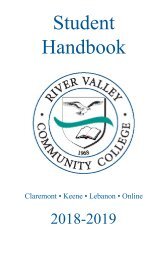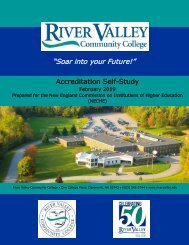You also want an ePaper? Increase the reach of your titles
YUMPU automatically turns print PDFs into web optimized ePapers that Google loves.
the College. Faculty mentors often have to work closely with new instructors to ensure<br />
that the <strong>RVCC</strong> standards are met. All Running Start classroom visits are documented with<br />
standard forms and are evaluated and housed by the Running Start Coordinator.<br />
Academic Policies and Academic Freedom<br />
All students must earn a passing grade on either a 10-point scale or a 7-point scale (for<br />
many allied health and health science programs) in order to be awarded credit. Passing<br />
grades for courses may vary between departments per individual program policy.<br />
<strong>RVCC</strong> policies outlined in the Student Handbook (pages 22-24) define Satisfactory<br />
Academic Progress at the College as the Cumulative GPA of credits earned against the total<br />
number of credits attempted in the student’s program of study. They also provide<br />
definitions and guidelines for the classifications and criteria for Academic Probation and<br />
Academic Suspension. Policies are clear and identify academic as well as Financial Aid<br />
implications for continuation in programs. The Student Handbook also identifies policies by<br />
which the student has the right to appeal decisions impacting their progress through the<br />
college programs.<br />
All Program Directors are directly responsible for developing course content including<br />
required competencies. These competencies are expected to be written in measurable<br />
terms and are evaluated by the Curriculum Team before implementation in the classroom.<br />
The Program Director, through the development of the course outline also identifies what<br />
teaching and assessment methods may be used for each course.<br />
Individual faculty have the academic freedom to deliver content as they see fit so long as<br />
they meet the course competencies, follow the learning objectives, and develop clear<br />
assessment techniques to measure objectives. Faculty are responsible for following the<br />
course outline to ensure that students are assessed appropriately for all outcomes and that<br />
grading criteria from classroom assessments are accurately reflective of student work.<br />
The Student Handbook defines cheating and plagiarism in the Student Code of Conduct<br />
Section C (page 44). Each faculty member is responsible for ensuring that all submitted<br />
student work is their own work or cited properly.<br />
Course Transfer & Credit Awarded for Prior Experience<br />
Each course that a student wishes to transfer into <strong>RVCC</strong> is evaluated by the Program<br />
Director who oversees the content area of the course being requested for transfer<br />
evaluation. This ensures that content experts in each field are directly involved in the<br />
decision for which transfers can be completed. Program Directors evaluate course<br />
descriptions, and when needed, course syllabi to ensure similar objectives, assessments,<br />
and credit load prior to accepting courses for transfer. Our high school program, Running<br />
Start, is described above and all credits for the dual enrolled students are awarded directly<br />
by <strong>RVCC</strong>. CBE’s are described below and require students meet the final assessment of<br />
the course before being approved for credit.<br />
Transfer of credit from outside institutions follows a clear policy which is available in the<br />
Student Handbook (page 17). The College allows for transfer in of any course which<br />
meets our course objectives and competencies, has the same or greater credit load, and is<br />
no greater than ten years old. Occasionally, a content expert will allow for transfer of a<br />
47 | P a g e





